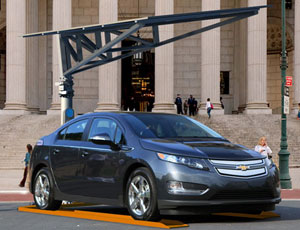Two San Diego firms, Reno Contracting and Envision Solar, have entered into a strategic alliance to deliver a chain of solar-powered charging stations for electric vehicles in the southwest.

Envision Solar, a sustainable infrastructure designer and developer headed by former Tucker Sadler Architects CEO Robert Noble, will supply its Solar Tree integrated solar parking arrays, which include EnvisionTrak tracking technology and CleanCharge system-integrated charging stations. General contractor Reno Contracting will construct the stations.
Plans call for a first project during the second quarter of 2011, followed by an accelerated multi-location rollout at corporate and commercial campuses through this year and beyond.
Envision says its parking area solar array charging systems are 20% to 25% more productive than conventional fixed solar photovoltaic systems.
According to Noble, this increase is achieved by incorporating hybrid multi-access tracking, which enables the solar panels to follow the sun throughout the day. Energy from the panels will be used to charge electric vehicles or be delivered to the power grid. Feeding all excess solar energy back into the power grid supports the State of California’s mandate of reaching 33% renewable energy by 2020, he says.
Under the agreement, Reno Contracting, via its Reno Efficient Sustainable Practices (ESP) division, will assist Envision in refining procurement of project materials, logistics for fabrication and delivery, entitlement and permitting, master scheduling, pricing, construction management and other construction related services, according to Walt Fegley, Reno’s president.
Fegley says the cost of each Envision Solar charging array is “in the neighborhood of $150,000.”
“We certainly believe there is a market for this, slow to start but once there are a few in the ground locally, it will rapidly expand,” he adds.
At press time, Envision Solar has a contract or commitment from General Motors for 4,500 of the charging stations.
Fegley says that the alliance, strategically, will start with current customers, universities, municipalities and the biotech community. The alliance’s message is that building owners hoping to attract the younger brain trust graduating today and looking for hi-tech jobs will need to satisfy their demand for sustainable solutions.
“Plugging an electric vehicle into a grid powered by coal burning electricity will not be the answer,” Fegley says, adding that the principals are targeting the six states of the southwest – California, Nevada, Arizona, Texas, New Mexico and Colorado – and that it anticipated that 85% of all solar nationally will come from those states.
Meanwhile, Fegley says ESP, along with 10 local firms, has a five-year contract with San Diego County to perform energy audits and water usage analysis on all county buildings and to provide the county with “prioritized lists of improvements that will have a large impact on energy savings and provide a rapid return on investment, basically showing them where the best bang for the buck lies.”
Fegley says ESP has also been doing solar PV work with Sun Edison and Borrego Solar, “possibly 5 or 6 megawatts under contract.”
Post a comment to this article
Report Abusive Comment